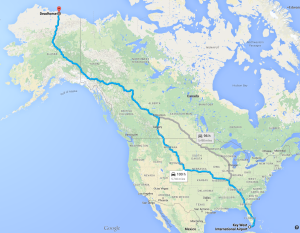It has been a few years since I took a lengthy road trip, enough that this is my first one undertaken with GPS to tell me where to go. In the past I made do, somehow, with a road atlas and enough patience to get lost on occasion without worrying too much.
GPS is one of those things that makes life so much easier that we don't even notice (or mind) that it's making us dumber. Don't get me wrong, I would never recommend against using it. I am curious, though, to see what would happen if you handed a teenager who has never lived without "navigation" a map. Or hell, try the same with an adult who has been taking orders from the disembodied voice of gentle authority for more than a decade now. Cue the mental image of Michael Scott driving a car into a lake because the GPS voice told him to keep going. Is that the route (SWIDT?) we're headed?
In Nicholas Carr's The Glass Cage (recommended, if a bit dry) he talks about GPS as an example of how automation makes our lives better but imposes a strange sense of detachment on our actions in many cases. This week I am putting his claims to the test, and he's not wrong.
buy cialis professional generic buy cialis professional online over the counter
Without having to worry about where I'm going the amount of involvement in the process of driving falls sharply. It's great – I reach my destinations and I can devote my attention to things (audiobooks) other than finding the correct route. But at the end of the day, it's remarkable how little I can recall: what highways I drove on, what towns I passed through, and so on. Without even trying I've tapped into the Autopilot mode, paying only enough attention to hear the voice tell me to turn right in 1/4 mile.
It's tempting to engage the Who Cares argument here; paper maps are archaic.
Why bother learning a skill that cheap, widely available technology can do faster and better. I'm not about to start a Hipster Luddite No Navigation Movement that encourages people to revert to street maps (and, on longer trips, a sextant) to find their way. It is just one of the more interesting examples of the mixed blessing of labor-saving technology. Finding our way is one less thing for us to think about now, for better and worse.

